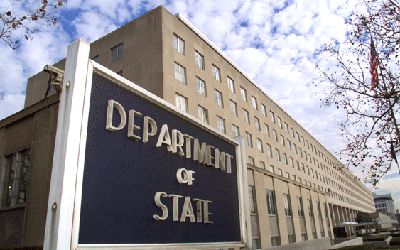 The United States of America is strongly committed to the prosperity, sovereignty, stability, and security of the five Central Asian countries as well as a vision of regional economic connectivity through its New Silk Road initiative, the U.S. Department of State said.
The United States of America is strongly committed to the prosperity, sovereignty, stability, and security of the five Central Asian countries as well as a vision of regional economic connectivity through its New Silk Road initiative, the U.S. Department of State said.
Since Kazakhstan, the Kyrgyz Republic, Tajikistan, Turkmenistan, and Uzbekistan gained independence in 1991, the United States has provided approximately $8.8 billion in assistance to programs supporting its partners in Central Asia.
New U.S. Assistance:Competitiveness, Training, and Jobs: This new multi-year program seeks to increase the competitiveness of Central Asian economies. This program plans to expand exports in the priority sectors of horticulture and transport/logistics in Kazakhstan, the Kyrgyz Republic, Tajikistan, Turkmenistan, and Uzbekistan with outreach to businesses and trade authorities in foreign markets including Afghanistan and Pakistan. It seeks to assist private sector firms in those industries to: understand the opportunities and requirements of markets; adopt technologies and techniques and develop the skills needed to produce to international standards; establish relationships with potential buyers and suppliers for long term growth; demonstrate new practices, technologies, or approaches that have potential to benefit the industry as a whole. The project also seeks to create jobs and provide private-sector skills training for youth who lack economic opportunities within Central Asia.
Central Asia Trade Forum: The United States recently hosted the fifth Central Asia Trade Forum in Almaty bringing together more than 500 entrepreneurs, traders, businessmen and policy makers to discuss the regional trade environment and conclude trade deals. We are committing to hold another six forums and, with a new digital interactive component, expect to more than double participation at upcoming forums and expand youth participation.
Climate Adaptation & Mitigation Program for the Aral Sea Basin: The World Bank plans to launch a new long-term climate change initiative in Central Asia, “Climate Adaptation & Mitigation Program for the Aral Sea Basin." The United States supports a partnership with the World Bank and welcomes other partners to address the trans-boundary impacts of climate change. The project will:• Provide a platform for ongoing dialogue and information exchange on climate change among Central Asian countries, building confidence for increased cooperation.• Support multi-level stakeholders – from farmers to government agencies – to raise awareness of climate change and appropriate responses.• Strengthen local beneficiaries (such as farmers and communities) to be more resilient to climate change by piloting new technologies.• Support systematic evaluation of these climate investments in order to accelerate learning, replication, and scale-up.
Smart Waters: This new U.S. multi-year program for the five Central Asian countries and Afghanistan seeks to build a cadre of managers capable of managing shared water resources to maximize their economic value. Smart Waters is being implemented through the Regional Environmental Center for Central Asia (CAREC), a local NGO, to:• Train a new generation of water managers – through both short-term professional development and a University-based Master of Science program – with the skills to maximize water's overall value among stakeholders.• Support selected river basin organizations to improve planning and demonstrate sustainable water management.• Build trust through collaboration and people-to-people interactions among water managers across Central Asia and Afghanistan.
American University of Central Asia: The United States has provided more than $30 million since 2002 to support the American University of Central Asia (AUCA). We plan to continue our strong support to AUCA through 2018 by supporting scholarships and programs to increase the university's long-term sustainability.
Professional and Educational Exchanges: The United States intends to expand the number of Muskie Internships available for Central Asian Fulbright Foreign Student Program participants in the disciplines of economics, education, environmental policy and management, international affairs, journalism and mass communication, law, library and information science, public administration, public health, and public policy.
Central Asia Regional English Language Initiative: This new three-year effort seeks to support English teachers and learners in Central Asia, providing a gateway to economic and educational opportunities. The initiative includes working with local partners on innovative approaches to expand English learning; sending up to 30 American Specialists to the region to conduct workshops, curriculum development, and teacher training; providing 150 English teachers from Central Asia with access to a virtual professional development course designed by U.S. universities; supporting 1,500 young learners across the region with two years of after-school learning opportunities; and holding facilitated Massively Open Online Course sessions on English for Special Purposes reaching thousands across the region.
Cultural Preservation: A crossroads of culture and civilization since the earliest of times, Central Asia has produced a wealth of architectural, literary and scientific treasures. Recognizing the importance of preserving Central Asia's rich cultural heritage, the United States, in partnership with Central Asian government and private sector partners, intends to continue to offer strong financial and programmatic support for cultural preservation projects in the region.
Source: akipress.org
 В Атырау -10
В Атырау -10